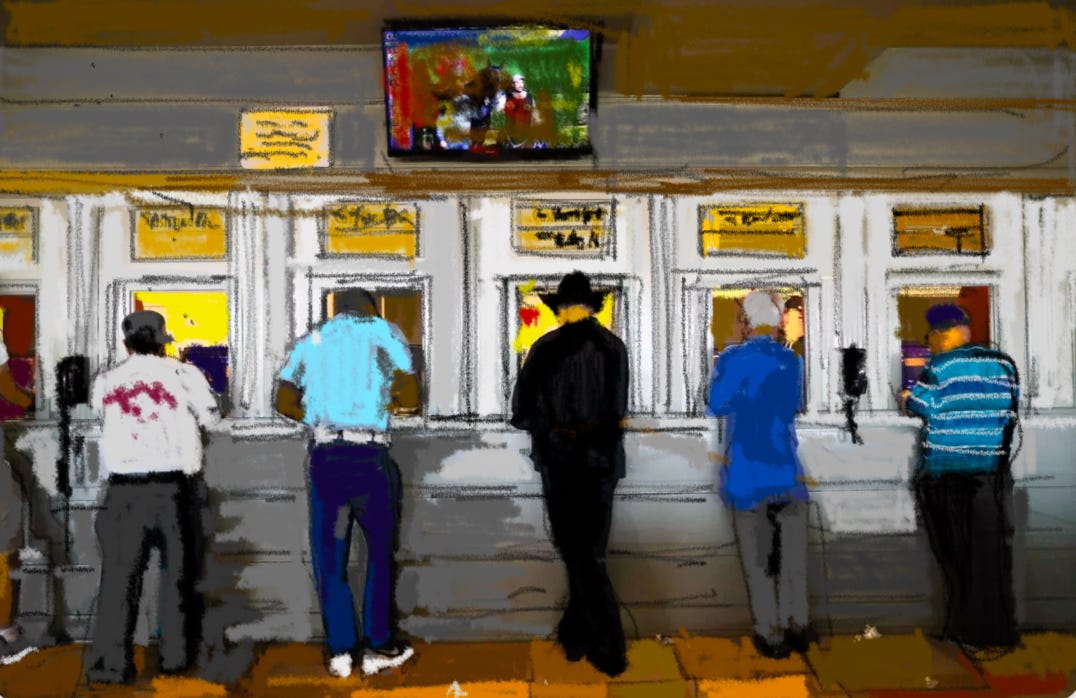“The racetrack is just another job, finally, and a hard one too.” —Charles Bukowski
To my teenage mind there was nothing so romantic as the race track. People were literally getting rich (or at least making a living I was sure) simply by paying close attention to statistics and having the courage of their convictions.
As sports-obsessed teens practically all we did was collect and cite statistics—batting averages, rushing yards, 3-point percentages. I hated math in school, but sports stats were different, and horse racing statistics were on another level. In addition to betting odds, the horse player needed to consider the weight of the jockey, the race distance, the condition of the track’s surface, a horse’s Beyer speed figure—even the horse’s bloodlines. If ever I was suited for a profession, I decided, it was that of a horse gambler or so-called handicapper.
We’d ditched school again to go to the horse races. We were only 17, so technically not old enough to bet on horses, but I don’t remember anyone questioning us—probably because so few high school kids hung around the track during the week.
The first few races didn’t go well as we lost our $2 and $5 bets, but then it happened—our 30-to-1 longshot began moving up on the outside. We ran to the rail and screamed with the rest of the crowd, smacking our rolled Racing Forms against our empty hands just like the old pros. We won at the wire. We jumped up and down, high-fived and hugged.
We were nervous about collecting our money and briefly considered asking some kind stranger to do it for us, but after scanning the many desperate faces we decided it was better to risk cashing out ourselves. Dustin went to the window since he looked the oldest. Before long he returned holding up and fanning-out twenty dollar bills. I remember a few unsettling stares from nearby gamblers—some of whom I’d seen picking through tickets on the ground in the hopes of finding a mistakenly discarded winner. We were probably lucky to make it to our car. Having turned such a substantial profit we decided right then to make trips to the race track a more regular part of our lives.
Another important skill for the horse player, of course, is the ability to schmooze with the other veteran handicappers—to get the inside scoop or consensus. It so happens we knew one of the regulars—a guy named Don, who was our sometimes friend Steve-O’s dad. Steve-O came from a broken home of sorts. I remember his mom offering to buy us vodka when I was sleeping over during my 7th grade summer. Don was never around, and now I knew why—he was playing the ponies. I don’t think we ever went to the track without bumping into him. It could’ve been weeks since we’d been there, but Don wouldn’t ask what we’d been up to or about Steve-O, he’d just walk up in his polyester shirt and say something like, “Hey boys. Who do you have in the 8th?”
Eventually, after enough losing trips to the track, the horse-handicapping lifestyle lost a little of its shine for me. I’d also started to question whether the professional gamblers I knew were doing as well as I’d assumed. One of my dad’s friends, Sal, was a daily regular down at Santa Anita in Southern California—he worked in real estate and drove a green Jaguar. We met up once and he took us to the track. Sal taught me how to work the exotic bets—exactas, trifectas, superfectas, wheels, and pick 6s. He gave me some tips and I actually hit a big winner that day. Sal didn’t seem especially excited when he’d win though—like the high had worn off. I still thought he was living the life, but I remember my parents telling me later about his credit card debt and how “Sometimes he’s up and sometimes he’s down.” Not long after our visit he was divorced and everyone says he sort of disappeared, but I was pretty sure I knew where you could find him.
A year or so later I discovered a more sure way of making money—I became a bookie at my high school—taking bets from other students. It started sort of informally, but before long it consumed a lot my time. I’d clip the sports odds lines and Bay Meadows and Golden Gate Fields race info from the newspaper each day, and I carried them around my green notebook with an envelope of cash. Business was brisk until I got called into the vice-principal’s office. Our school counselor was also present at the meeting. When they accused me of bookmaking I tried to play it down, saying it was just me and a few friends messing around. But that’s when the vice principal slapped my green notebook on the desk and opened it to expose my notes of customers, dates and bets. They’d searched my locker. “This type of thing doesn’t lead to to anything good,” he said sternly. “You keep this up and you’ll end up in a gutter somewhere—or worse.”
Postscript: I still remember my winning horse from that trip to Santa Anita—a mare named Brown Bess. I just looked her up online. Turns out she died back in 2011 at age 29. She was apparently considered small, at about 15 hands, but the article says, “She was all business when it came to racing. As tough in attitude as she was physically, she was unfriendly with both humans and other horses.” Although she earned some 1.3 million dollars, the article says she was “disappointing” since left no producing daughters to carry on her family line. —JC





Great story great lessons. I would play the county fair races every year. Realized right away I was never get rich but it was fun, hanging out with the handicappers